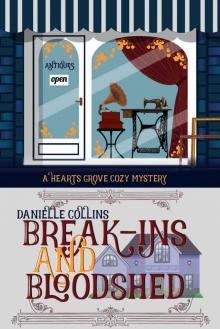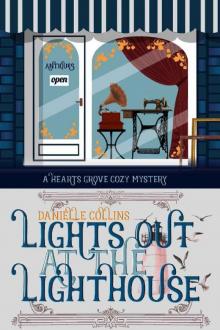- Home
- Danielle Collins
A Killer Cover Up Page 8
A Killer Cover Up Read online
Page 8
10
Margot pulled up to the gated front entrance of a large mansion overlooking the Potomac on the northern end of North Bank. She reached out her window and pressed the call button, waiting for a response.
“Hello?” came the crackling reply.
“Hello. Kathleen? This is Margot Durand. I called earlier?”
“Oh. Yes. One moment.”
Margot rolled her window up and waited. Finally, the gate slowly began to open. She was thankful she’d called ahead, only supplying enough information to get an audience with the now Mrs. Kathleen Shaw. Apparently, she’d divorced and remarried some years back and her husband was wealthy, to say the least.
Margot tried not to gape as she drove up the long, cobbled drive way toward the front of the house. She parked off to the side and walked past a large fountain showing three large birds with water shooting up between them. It was eccentric and elegant.
At the door, a Hispanic woman in a maid’s uniform greeted her formally and led her down a long hallway, the highly polished wood making the hard soles of Margot’s flats clack. When she entered the room the maid had showed her to, she selected a cushioned armchair and waited.
The room she was in looked like it served the purpose of a sitting room and small library, with one wall showing off books artfully arranged with vases and expensive-looking knick-knacks. It spoke of elegance and femininity with a floral print couch and the delicate pink armchairs.
“Why, hello,” Kathleen said, swooping into the room wearing a tight-fitting business suit and low heels. Her hair, which Margot remembered being a mixture of gray and black, was now completely black, obviously dyed, but in such a natural way Margot wouldn’t have guessed it wasn’t natural if she hadn’t known Kathleen before.
In fact, all of Kathleen looked…improved. She was fitter than Margot remembered, and her face lacked many of the wrinkles Margot remembered. It appeared that her new lifestyle required a new look as well.
“Hello, Missus Shaw.”
“Oh, please,” she said, coming up to Margot and offering a slight embrace. It felt forced and awkward, but Kathleen acted as if it were anything but. “We’re old friends. Call me Kathleen. Do sit down.”
Margot regained her seat and watched as Kathleen perched on the edge of the floral couch. She sat ramrod straight and had a look of superiority on her elegant features. Or perhaps that was how she looked all the time now, what with the plastic surgery she’d no doubt undergone.
“So you’re here to chat about old times?” Kathleen offered a slight shrug.
“I just had a few questions about when you used to work at the police department,” Margot began.
“Oh, my.” Kathleen tossed a hand elegantly in the air. “Do I have to relive that time in my life? It feels like it was ages ago.”
Margot thought that six years hardly accounted to ages, but she didn’t tell her this. “I realize it was a while ago, but I’m mostly interested in the time around my husband’s death.”
“You poor dear,” she said, coming as close to a frown as she could. “I know this must be hard for you. Why dredge up the past? I told Cline—that is, my husband—that the past is just that. We only live in the now, mind you.” She gave a light laugh.
Margot couldn’t afford that luxury. “I understand, but I think that Julian was investigating something on the side, something that wasn’t an actual case at the time. I wondered if you knew anything about it? He’d mentioned your name in one of his journals…”
“Oh, those journals.” Kathleen shook her head, sending a perfect, black curl over her shoulder. “He was always writing in them. I used to think that he might be writing a book—you know how he loved to read those crime novels—but he assured me it was all business.”
“Right.” Margot frantically searched for a way to delicately ask about Kathleen’s reputation at the office. “But, I think he was looking in to the evidence locker.”
Kathleen erupted into a bout of giggles, making her seem like a much younger woman. Margot wasn’t sure what she’d said, but she could only hope that Kathleen was in an expansive mood.
“I don’t mind talking about this now,” she began without preamble, “because dear Cline and I have shared everything about our pasts—and presents—” She winked and Margot shuddered. “—but I was a bit of a temptress back in those days.”
Margot held her tongue rather than blurt out the fact that she’d heard as much.
“I was very familiar with that evidence room.”
Margot knew she was blushing and hoped the woman wouldn’t notice.
“I was having an affair, truth be told. I’m not proud of it, but it did get me out of a dreadful marriage, and then I found Cline and things have never been the same.”
It was quickly becoming clear that Margot wouldn’t get anything useful from this interview. How could she when Kathleen had been so wrapped up in other men that she obviously wouldn’t have had time for much else?
“I see,” Margot said, about to make her excuse to go.
“I do think I remember the time you’re talking about, though,” she said, as if Margot hadn’t spoken. “It was just a few weeks…before. I remember it because I saw that man, Richard Westerly, watching me. I thought he was interested, you know, but I confronted him and he told me he was keeping tabs for Julian. I couldn’t add much to his ledger, though I had seen that boy…” She squinted. “He was handsome and young—too young for me, of course—but he was somewhat of a legend at the time.”
“Ben?” Margot supplied.
“No. That man thought he was something when he wasn’t. The youngster. I can’t remember his name at all because he was fairly new to the department. I just remember he walked in on me kissing—well, it’s not important who I was kissing—but it was very awkward. But I just remember thinking that he shouldn’t have been in there at that time. No one should have. Then, when I asked him what he was doing, he held up his hands and said he’d come in the wrong door.”
Margot frowned. That sounded suspicious in general, but if Julian had already been looking into activity in that room then it was even more curious.
“He had nothing in his hands?”
Kathleen rolled her eyes. “If I can’t remember his name, I certainly wouldn’t remember—” But she stopped and thought for a moment. “You know what? He didn’t have anything in his hands. I remember his actions clearly for some reason. Oh, how the mind does strange things,” she said dramatically.
Margot frowned. She didn’t want to put things into Kathleen’s head, but why would an officer come in to an evidence room without evidence? Granted, there were plenty of reasons, the first being his own explanation that he’d come in the wrong room, but if Richard had already noted Eli coming in several times before, it was unlikely he’d make that type of mistake.
“You don’t remember anything else about that incident or others?” Margot asked.
“Not that I can think of.” She let out a sigh and relaxed back a few inches. “Those were good times, I suppose. Not so bad to remember. Especially that fish.”
Margot frowned. “What?”
“Oh.” Kathleen smiled and gave a little laugh. “Just thinking about Julian, the one thing I loved the most about him—in a completely platonic way of course,” she said with a wink toward Margot that made her skin crawl, “was the fish he’d bring in after his long lunches.”
Margot’s eyes shot up. “Fish?”
“Why yes,” she said, looking at Margot like she’d grown a tail fin. “He was going once a week, if not more sometimes. On that boat…goodness I can’t remember anything these days. I believe it was called the Étoile. I just remember him coming in looking so refreshed.”
Margot felt her face heat again. It appeared Kathleen would have flirted with anything that was male back then and now, even the memory of Margot’s husband. But a boat? Named the Star? How had she not known about this?
“Thank you for telling me that.
I didn’t know about the boat.” It cost her to admit that, but Kathleen turned kind eyes on her.
“Don’t worry. No one ever tells anyone everything about themselves.”
Margot wanted to argue, but she wanted to leave more, so she merely smiled and said, “Well, you’ve been very helpful. Thank you so much.”
“You’re so welcome. I rarely get visitors.”
Margot wasn’t surprised but kept the uncharitable thought to herself. “Good afternoon.”
As she drove back down the driveway toward the slow-moving gate, Margot felt dazed. Julian had had a boat? How was it possible she’d never known about it? And why hadn’t he told her? Margot turned back onto the road and made her way toward the harbor. She was going to get to the bottom of this, but she was beginning to feel as if she might lose part of her husband in the process.
Margot felt the cool, salty breeze on her face as she walked toward the harbor master’s quarters. She’d been down here plenty of times, but she’d never had to come searching for a ship her husband had apparently bought without her knowing.
It was hard to think that was even possible, knowing that they had been so close and he’d told her everything—or so she’d thought—but he had done their finances and she’d always trusted him.
Pausing before knocking, she closed her eyes and took a deep breath. No matter what happened or what she discovered, she wouldn’t let it tarnish her memory of Julian. He had loved her and she was certain of that. The thought that he might not have felt he could tell her about a boat made her upset, but she wouldn’t give in to those emotions. At least not yet.
Her fist connected with the solid wood of the door and a voice told her to come on in. She opened the door and entered the small room. It felt crowded with a large desk to one side that was covered in papers and then the two, worn chairs across from the desk, but she smiled at the weathered man and took the offered seat.
“How can I help you?” he asked after she’d introduced herself.
“I’ve come by some knowledge that my husband had purchased a boat that I didn’t know about.” She tried not to grimace at the words. “This would have been over six years ago. I wanted to see if there are any records to that and what might have happened to the boat. My husband passed away about six years ago as well,” she added by way of explanation.
“You’re in luck,” the man said with a kind smile. “I’ve been here about fifteen years. What was his name?”
“Julian Durand.”
“Let me look through my records.” The man stood and went to a file cabinet to look, and Margot took in the view from the office. It overlooked rows of docks, the masts of a few sailing ships and the antenna of others crowding the view. It was likely a busy job for him, knowing that there were many fishing companies as well as recreation companies that took people out on the Potomac as well as the Atlantic beyond.
“Ah, here we are.” He turned around, waving a paper in triumph. “Let’s see.”
He skimmed over the documents, then met her gaze.
“What is it?” she asked, uncertain as to what his expression meant.
“This is a little…unusual.”
“In what way?”
“Mister Durand did purchase a boat, and I do have a slip number for him and everything…” He looked back down at the paper. “But it says he’s paid up.”
Margot frowned. “I don’t understand.”
“According to my records, he’s paid up as of this month.”
Margot’s eyes widened. “As in he paid in advance?” Though six years in advance seemed unlikely.
“No. As in he made a payment at the first of this month as he’s done the first of every other month.”
“That’s not possible.”
The man shrugged. “Says so right here. Says the boat is registered to him as well.”
“May I know the slip number?”
He frowned. “I can tell you, especially seeing as you’re his wife, but I’m not sure what to do about all of this.”
“Let me go take a look and I’ll make sure to come back before I leave. We’ll straighten this out.”
“I can check with my office boy. He’s the one who takes the payments and keeps most things organized.”
“Just wait until I see the slip, if that’s all right?”
“‘Course.” He stood when she did. “Do you want me to go with you?”
Margot thought about it for a moment but shook her head. “No, but thank you.”
When she left the small office, the scent of the sea hit her like a wall. She wasn’t sure what to think about all of this, but it wasn’t adding up and that meant something. What, she didn’t know, but she would certainly find out.
She followed the man’s directions, steeling herself for what she might find. Who had been paying for the slip for her husband’s boat? And why?
At the end of the dock she was on, she saw it. The Étoile sat tall and proud, a little worn-looking but in good condition, or so she assumed. It looked to be a regular fishing boat, but the kind that had a lower deck. She wondered if someone was there.
She halted at the stern of the boat, looking back the way she’d come. No one was around and the two neighboring slips were empty. No one to ask about the occupant of the boat, if there was one. But didn’t there have to be? Or at least someone who kept up maintenance on it.
Feeling emboldened by the fact that there were things she didn’t know about her husband’s past, she stepped on to the boat, careful to hold on to anything she could to keep her balance.
“Hello?” she called out. No one answered.
Swallowing down any fear she might have, she made her way to the cabin door. She was just about to open it when it burst outward. Margot almost lost her balance but caught the railing in time to keep herself upright.
The man looking back at her seemed equally startled, his hand clasping the door. “Who are you? And why are you on my boat?”
Fully regaining her balance, she stood up straight. “I’m Margot Durand. Apparently, my dead husband owns this boat.”
The man blinked then paled, his weathered skin turning almost translucent. “Did you say D-Durand?”
“I did.” She met his gaze with a bold one of her own.
“Looks like I’ve got some explaining to do.”
“I think you do.”
He rubbed a hand over his close-cropped, gray hair and nodded below. “Care to go below deck with me?”
She narrowed her eyes at him.
“I know,” he said, holding up his hands, “doesn’t sound too good, but I promise you, Missus Durand, I’m a good man. Your husband would have vouched for me.”
The sailor’s use of the tense “would have” made it clear that he knew Julian had died. There could be no mistaking the fact that he was still on the ship that apparently had belonged to Julian. What was going on?
She hesitated only a minute, but the kindness that had replaced the surprise in the sailor’s eyes convinced her. “All right, lead the way.”
They walked down the small, narrow steps to a surprisingly spacious interior, at least for what Margot had expected. It was neat and tidy, and she shot the man a surprised look at the tasteful, nautical decorations.
“I know, it’s not much, but it’s home.”
That was when she looked to the front of the space and saw a bed partially enclosed by curtains. “You live here? On this boat?’
He nodded. “I do.”
This was becoming more and more surprising. Margot made her way to the galley table and slid into a seat as the sailor took the seat across from her.
“I’ll start with my name, ma’am. I’m Ken Lasson.”
“Nice to meet you,” she said, trying to keep her gaze from roving around the charming space. “It’s very…homey down here.”
“It is. And clean. I can’t stand a messy area.”
“I’m sure that helps while living in such tight quarters.”
He n
odded. “About all of that…” Ken let out a large sigh. “I’ll apologize now for the fact that this is all, obviously, news to you.”
“It is,” she agreed.
“I met your husband over six years ago. He’d come down to walk along the docks when he was on his lunch break, the NBPD isn’t far away, and we struck up a conversation.”
“Have you always been a fisherman?”
“Not exactly.” He ran a hand along the back of his neck. “I was actually homeless at the time we started talking.” Margot’s eyes widened. “Your husband started to bring me food and we’d share lunch together. I looked forward to the days that he’d come, and I’d like to think that we really became friends during that time.”
“Julian was easy to get along with,” she said, reminiscing.
“Exactly. So, then one day he comes up to me and says he’s got an idea. I wasn’t sure what he was going to say next, but he said it was a shame that we couldn’t actually fish and what would happen if he got a boat and I helped him with it.”
Margot’s eyebrows rose.
“I know it sounded crazy, but after weeks and weeks of me telling him no, because I didn’t want him to spend his money on me what with a family to support—” He gestured to Margot. “—but he insisted he had some set aside.”
Margot thought back to the time this would have been going on. She couldn’t be sure, but from the notes of Julian’s that she found in their finances after his death, he’d been saving up for her bakery. Had he taken money from that when he saw a greater need? Puzzle pieces began to click. It was exactly something Julian would do. He wouldn’t have wanted to admit to Margot that he’d been saving for her dream and then borrowed money from it for this venture.
“He bought the boat,” Ken continued, “and said he’d let me stay on it free of charge up until I could bring in some money fishing. Then he said I could start taking over the slip payment and eventually buy the boat from him if I so chose to.”
Margot shook her head. This was exactly something her husband would have done.
“So I did. I stayed on the boat, got my act together, and began bringing in good cash. Julian would still come to see me and even went out every once in a while. It was slow at first, but soon, I was making enough to pay the slip payment and was just about to start paying Julian back for the boat when he was killed.” Ken’s gaze dropped to his hands on the table. “I know I did the wrong thing. I should have come to you and fessed up, but I had a good thing and I wasn’t hurting anyone. Then again, that’s what I’d thought. Anyway.” He slid out of the seat and went to a lockbox to get an envelope. “Here. This is what I owed Julian for the boat, plus interest. After that other fellow came by, I knew my time was going to run out. I understand if you want the boat back, but this is a fair price for it.”

 Murder and Matrimony
Murder and Matrimony Catering and Crime
Catering and Crime Break-ins and Bloodshed
Break-ins and Bloodshed A Killer Cover Up
A Killer Cover Up Lights Out at the Lighthouse
Lights Out at the Lighthouse Croissants and Corruption: A Margot Durand Cozy Mystery
Croissants and Corruption: A Margot Durand Cozy Mystery A Deadly Engagement (Margot Durand Cozy Mystery Book 9)
A Deadly Engagement (Margot Durand Cozy Mystery Book 9) Murder in Maine (Margot Durand Cozy Mystery Book 7)
Murder in Maine (Margot Durand Cozy Mystery Book 7) Desserts and Deception: A Margot Durand Cozy Mystery
Desserts and Deception: A Margot Durand Cozy Mystery Murder in Maine
Murder in Maine A Deadly Engagement
A Deadly Engagement Bakeries and Bodies
Bakeries and Bodies Pastries and Pilfering
Pastries and Pilfering Pastries and Pilfering: A Margot Durand Cozy Mystery
Pastries and Pilfering: A Margot Durand Cozy Mystery Bakeries and Bodies (Margot Durand Cozy Mystery Book 8)
Bakeries and Bodies (Margot Durand Cozy Mystery Book 8) Margot Durand Cozy Mystery Boxed Set: Books 4 - 6
Margot Durand Cozy Mystery Boxed Set: Books 4 - 6